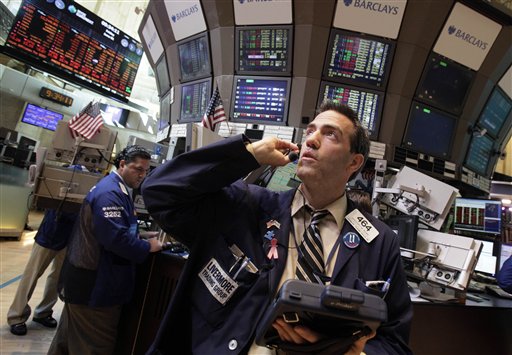U.S. stocks are closing with their biggest declines this year after a dismal jobs report and troubling economic news from overseas.
The government said today that employers added a net 69,000 jobs in May, far fewer than analysts expected. Unemployment in the 17 countries that use the euro stayed at a record-high 11 percent, and there were signs that China’s growth is slowing.
The Dow Jones industrial average closed down 275 points at 12,118, its biggest decline since November. The Dow is down 0.8 percent for the year.
The S&P 500 index closed down 32 points at 1,278. The Nasdaq composite index closed down 80 points at 2,747.
Six stocks fell for every one that rose on the New York Stock Exchange. Trading volume was heavy at 4.58 billion shares.
The jobs report, considered the most important economic indicator each month, also said that hiring in March and April was considerably weaker than originally thought.
“The big worry now is that this economic slowdown is widening and accelerating,” said Sam Stovall, chief equity strategist at S&P Capital IQ, a market research firm.
Earlier data showed weak economic conditions in Europe and Asia, too. Unemployment in the 17 countries that use the euro currency stayed at a record-high 11 percent in April, and unemployment spiked to almost 25 percent in Spain.
There were signs that growth in China, which helped sustain the global economy through the recession, is slowing significantly. China’s manufacturing weakened in May, according to surveys released today.
Traders sold all types of risky investments and stampeded toward the safety of U.S. government bonds and gold. Bond prices rose sharply, pushing the yield on the benchmark 10-year U.S. Treasury note down to 1.44 percent, the lowest on record.
Gold for August delivery climbed $57.90, nearly 4 percent, to $1,622.10 per ounce.
“Everybody’s looking for a safe haven,” said Adam Patti, CEO of IndexIQ, an asset management firm. He’s skeptical of that strategy, believing the swing was driven by short-term traders “looking to flip in and out of things,” rather than long-term investors willing to ride out a few bumps in the market.
For much of the past three years, investors have bought gold for safety during a turbulent time for the world economy. That effect appeared to wear off this spring as the dollar strengthened against the faltering euro. Commodities like gold are often valued by dollars, so when the dollar rises, those commodities become more expensive.
May was the worst month for the stock market in two years by some measures. Investors’ worries about Europe’s debt crisis intensified as the month wore on. Greece’s political future is uncertain, and it appears increasingly likely to stop using the euro currency. That could rattle financial markets and make Greece’s economy — already hobbled — even weaker.
Send questions/comments to the editors.



Success. Please wait for the page to reload. If the page does not reload within 5 seconds, please refresh the page.
Enter your email and password to access comments.
Hi, to comment on stories you must . This profile is in addition to your subscription and website login.
Already have a commenting profile? .
Invalid username/password.
Please check your email to confirm and complete your registration.
Only subscribers are eligible to post comments. Please subscribe or login first for digital access. Here’s why.
Use the form below to reset your password. When you've submitted your account email, we will send an email with a reset code.